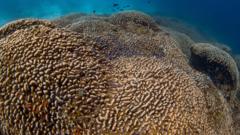In the Solomon Islands, rising sea levels are threatening the very existence of island communities. On Fanalei Island, a cultural tradition of dolphin hunting has turned into a vital source of income, enabling residents to seek refuge on safer ground.
**Dolphin Hunting: A Cultural Lifeline Amid Rising Seas in the Solomon Islands**

**Dolphin Hunting: A Cultural Lifeline Amid Rising Seas in the Solomon Islands**
Residents of Fanalei Island rely on dolphin hunting as a means to adapt to climate change, allowing them to purchase land away from their sinking home.
As dawn broke over Fanalei Island, the call of a conch shell signaled the start of the day for a group of dedicated dolphin hunters. Six villagers gathered in the small church, led in prayer by their priest—an age-old ritual performed in the shadow of climate crisis that now engulfs their small island home. Flooding from high tides is increasingly common, pushing community resilience to new limits.
Around them, the salty air filled with anticipation as they prepared to launch their wooden canoes into the deep blue Pacific. The ocean, while vital, poses risks—its waters are increasingly encroaching on their land. Nevertheless, this traditional practice has taken on a new significance; selling their catch provides crucial funds for buying land elsewhere as their home rapidly diminishes.
Lesley Fugui, a veteran hunter, spotted a dolphin fin cutting through the surface, a sight that sparked excitement within the group. He raised a 10-foot-long bamboo pole, signaling his colleagues to join him for the chase. Communicating across the waves through a simple phone call to his wife was a blend of tradition and modernity, showcasing their adaptive approaches to the ongoing crisis.
For these hunters, each successful catch brings not just sustenance but hope—a financial lifeline and a chance to maintain cultural identity as they confront the maelstrom of climate change. As the tides rise, the urgency of their hunts intensifies, underscoring an urgent narrative of resilience and the human spirit in the face of a warming world.
The dolphin's swim, once purely a cultural act, now acts as a beacon of survival for the people of Fanalei Island, illustrating the intersection of tradition, adaptation, and dire necessity in a world shifting beneath their feet.
Around them, the salty air filled with anticipation as they prepared to launch their wooden canoes into the deep blue Pacific. The ocean, while vital, poses risks—its waters are increasingly encroaching on their land. Nevertheless, this traditional practice has taken on a new significance; selling their catch provides crucial funds for buying land elsewhere as their home rapidly diminishes.
Lesley Fugui, a veteran hunter, spotted a dolphin fin cutting through the surface, a sight that sparked excitement within the group. He raised a 10-foot-long bamboo pole, signaling his colleagues to join him for the chase. Communicating across the waves through a simple phone call to his wife was a blend of tradition and modernity, showcasing their adaptive approaches to the ongoing crisis.
For these hunters, each successful catch brings not just sustenance but hope—a financial lifeline and a chance to maintain cultural identity as they confront the maelstrom of climate change. As the tides rise, the urgency of their hunts intensifies, underscoring an urgent narrative of resilience and the human spirit in the face of a warming world.
The dolphin's swim, once purely a cultural act, now acts as a beacon of survival for the people of Fanalei Island, illustrating the intersection of tradition, adaptation, and dire necessity in a world shifting beneath their feet.







